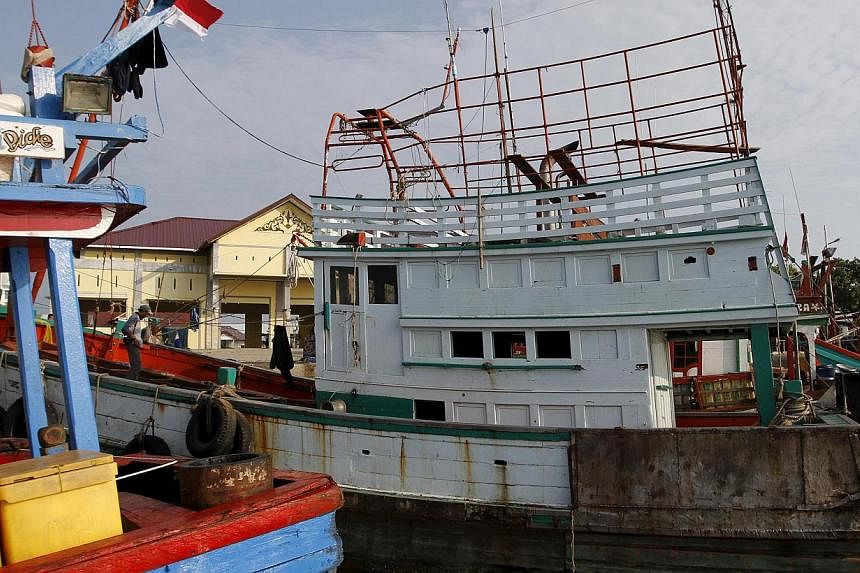DHAKA (Bloomberg) - Nazrul Islam was one of the lucky ones: He made it back to Bangladesh alive.
Hundreds of others who sneak out on rickety boats either drown in Southeast Asia's seas or get dumped in mass graves like those discovered in Thailand and Malaysia this month.
Islam, who took the journey in 2013, had no idea it'd be so bad.
"The ship is like a death trap," the 22-year-old said on May 22 in Elomdi village in central Bangladesh, about a 90-minute drive from Dhaka, the capital. "Once you're on it, there's no going back."
While Rohingya Muslims in neighbouring Myanmar flee political persecution, most who leave Bangladesh simply want more money for their families. They easily fall prey to traffickers who promise them higher paying jobs in Malaysia, a fellow Muslim-majority country that is 10 times richer than Bangladesh.
The mass graves have prompted Thai and Malay authorities to disrupt the smuggling rings in recent weeks, leaving what may be thousands of people stranded on overcrowded boats. Indonesia and Malaysia agreed to provide temporary shelter to them earlier this month, and Thailand is hosting at least 17 nations on May 29 to find a regional solution.
Bangladesh has one of Asia's youngest populations, with about a third of its 166 million people under the age of 15. While most of the workforce is in the agricultural sector, the country has developed a garment industry that is now the world's second-largest. Youth unemployment is about 13 per cent.
- Trafficking Industry -
Remittances from more than 7 million overseas workers are a key driver of Bangladesh's economy. The country received almost US$15 billion ($20.2 billion) in 2014, up 9.2 per cent from the previous year.
The World Bank is looking at ways to use migrant savings to finance everything from airports to power plants.
The push to find work outside of Asia's fourth-poorest country also has spawned a lucrative trafficking industry, which is increasingly using sea routes to transport people.
An estimated 58,000 people migrated across the Bay of Bengal and Andaman Sea in 2014, according to the International Organization for Migration. Another 25,000 joined them in the first quarter of this year.
"These gangs have gotten more sophisticated, and they extend across the region," said Asif Munier, a Dhaka-based IOM staff member. "You need to counter the use of irregular routes with a prolonged public relations campaign. In remote areas, you don't have electricity, TV; people can't read the newspaper."
- Hellish Journey -
Islam first heard of the offer to go abroad from a fellow villager. The pitch sounded irresistible: Take a boat to Malaysia and make 40,000 taka (S$693) a month. That was about seven times more than he could make in Bangladesh.
He paid only 5,000 taka up front to start the journey, which took him and other villagers to the tourist town of Cox's Bazar and then to Teknaf, one of Bangladesh's southernmost points. Each person got a five-litre bottle of water, some rice and a local sugary snack.
They boarded a fishing boat and kept low to the ground to avoid detection. The ship sailed into the Bay of Bengal for about eight hours before they reached a bigger vessel already packed with both Bangladeshis and Rohingya.
The nine-day journey was hellish. Islam was forced into the ship's underbelly, which was dark, hot and smelly. When he tried to poke his head out above deck, a guard beat him.
"I almost lost sense of time," Islam said. "I was thinking of my wife, my nine-month-old daughter, my parents back home. I would've returned home if I could."
- Pay or Die -
Finally they arrived near southern Thailand. Small boats brought them onshore, and they were kept in separate jungle camps. The traffickers demanded payment of 250,000 taka to enter Malaysia - about 70,000 taka more than Islam had initially agreed upon. Those who couldn't pay would be killed.
Islam called his family in Bangladesh, which spent 10 days raising money from friends to pay the fee. After receiving the money, the traffickers took him over the border on foot in the middle of the night. A taxi brought him south to Penang, where he was supposed to meet a relative.
Before that happened, Malaysian police stormed the house where he was dropped and arrested him. He avoided a jail sentence by saying he was a minor, and was soon deported.
Others aren't so lucky. Sona Mia from a nearby village hasn't seen his son and son-in-law since November 2013, when they left for Malaysia on a similar journey.
- 'Mentally Sick' -
"I am still waiting for them to arrive home," he said, fighting back tears.
The governments of Bangladesh and Myanmar have little sympathy for those who make the trip. Bangladeshi Prime Minister Sheikh Hasina this week called them "mentally sick."
"They are tainting the image of the country along with putting their life into danger," she told officials of the labour ministry this week. Myanmar officials view Rohingya as illegal immigrants from Bangladesh.
For Islam, the chance at striking it rich has left him with a debt of 113,000 taka, about 20 times more than he used to make per month.
"There's no proper job in the village," he said. "I still want to go abroad, but this time not by ship - in a formal way."

